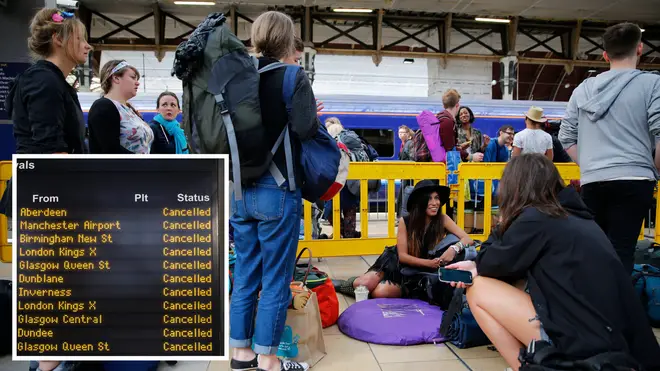
Lewis Goodall 10am - 12pm
7 June 2022, 16:53 | Updated: 7 June 2022, 22:57

Commuters face travel misery later this month as rail workers walk out for three days in a pay dispute and another Tube strike has been announced.
Members of the Rail, Maritime and Transport union (RMT) at Network Rail and 13 train operators will walk out on June 21, 23 and 25 in what the union says will be the biggest strike on the railways since 1989.
The dates of the rail strike clash with the start of the Glastonbury music festival which begins on Wednesday June 22.
Other events that week include England playing New Zealand in a test match in Leeds, the British athletics championships in Manchester, and gigs in London's Hyde Park by Elton John (June 24) and the Rolling Stones (June 25).
The RMT also announced another 24-hour strike on London Underground in a separate row over jobs and pensions.
Tube workers will strike on June 21 to coincide with the first rail strike, threatening widespread travel chaos.
Union members voted overwhelmingly for action last month in growing rows over pay and job losses.
Read more: Fury as petrol prices soar above £2 per litre as fuel cost hits record level
Read more: Boris hints at tax cuts to woo Tory rebels and pleads move on from confidence vote
Rail union RMT launch 3 days of national strike action across the railway network:
— RMT (@RMTunion) June 7, 2022
Over 50,000 railway workers will walkout as part of 3 days of national strike action later this month, in the biggest dispute on the network since 1989. https://t.co/CEaTfIQaOa pic.twitter.com/rhl0gLtCNw
The RMT said rail staff who worked through the pandemic were facing pay freezes and hundreds of job cuts.
RMT general secretary Mick Lynch said: "Railway workers have been treated appallingly and despite our best efforts in negotiations, the rail industry with the support of the government has failed to take their concerns seriously.
"We have a cost-of-living crisis, and it is unacceptable for railway workers to either lose their jobs or face another year of a pay freeze when inflation is at 11.1% and rising.
"Our union will now embark on a sustained campaign of industrial action which will shut down the railway system.
"Rail companies are making at least £500m a year in profits, whilst fat cat rail bosses have been paid millions during the Covid-19 pandemic.
"This unfairness is fuelling our members anger and their determination to win a fair settlement.
"RMT is open to meaningful negotiations with rail bosses and ministers, but they will need to come up with new proposals to prevent months of disruption on our railways."
The union said more than 50,000 railway workers will walk out on June 21, adding that the action will affect the national railway network for the entire week.
Angie Doll, Chief Operating Officer at Govia Thameslink Railway, said: “We are extremely disappointed that passengers across the country now face the anxiety of rail disruption just as we are starting to recover from the pandemic.
“Although GTR colleagues voted only for action short of a strike, unfortunately we do expect our services to be very severely disrupted because of full strike action affecting Network Rail and other train operators.
“We depend on Network Rail signallers and engineers to keep our trains moving, and our services connect with many lines and stations managed by other operators whose staff are taking action.
“We will provide more detailed passenger advice and information in the coming days. In the meantime, we urge the RMT to work with Network Rail and train operators to seek a swift resolution.”
Andrew Haines, Network Rail's chief executive, said: "We continue to meet with our trades unions to discuss their pay concerns and we're doing everything we can to avoid strike action on the railway.
"We know that the cost of living has increased and we want to give our people a pay rise, but the RMT must recognise we are a public body and any pay increase has to be affordable for taxpayers.
"Travel habits have changed forever and the railway must change as well. We cannot expect to take more than our fair share of public funds, and so we must modernise our industry to put it on a sound financial footing for the future. Failure to modernise will only lead to industry decline and more job losses in the long run.
"There are two weeks until the first strike is planned. We will use this time to keep talking to our unions and, through compromise and common sense on both sides, we hope to find a solution and avoid the damage that strike action would cause all involved."